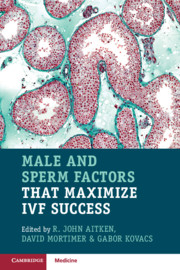Book contents
- Male and Sperm Factors that Maximize IVF Success
- Male and Sperm Factors that Maximize IVF Success
- Copyright page
- Contents
- Contributors
- Chapter 1 Sperm Selection for ART Success
- Chapter 2 New Horizons in Male Subfertility and Infertility
- Chapter 3 Chromosome Abnormalities and the Infertile Male
- Chapter 4 The Effect of Endocrine Disruptors and Environmental and Lifestyle Factors on the Sperm Epigenome
- Chapter 5 Lifestyle Factors and Sperm Quality
- Chapter 6 The Effect of Age on Male Fertility and the Health of Offspring
- Chapter 7 The Assessment and Role of Anti-sperm Antibodies
- Chapter 8 FSH Treatment in Male Infertility
- Chapter 9 Antioxidants to Improve Sperm Quality
- Chapter 10 The History of Utilization of IVF for Male Factor Subfertility
- Chapter 11 The Case Against Intracytoplasmic Sperm Injection for All
- Chapter 12 Perinatal Outcomes from IVF and ICSI
- Chapter 13 Artificial Insemination with Partner’s Sperm for Male Subfertility
- Chapter 14 Obstructive Azoospermia: Is There a Place for Microsurgical Testicular Sperm Extraction?
- Chapter 15 Should Varicocele Be Operated on Before IVF?
- Chapter 16 Donor Insemination: Past, Present and Future Perspectives
- Chapter 17 DNA Damage in Spermatozoa
- Chapter 18 Prevention of Male Infertility: From Childhood to Adulthood
- Index
- References
Chapter 3 - Chromosome Abnormalities and the Infertile Male
Published online by Cambridge University Press: 24 May 2020
- Male and Sperm Factors that Maximize IVF Success
- Male and Sperm Factors that Maximize IVF Success
- Copyright page
- Contents
- Contributors
- Chapter 1 Sperm Selection for ART Success
- Chapter 2 New Horizons in Male Subfertility and Infertility
- Chapter 3 Chromosome Abnormalities and the Infertile Male
- Chapter 4 The Effect of Endocrine Disruptors and Environmental and Lifestyle Factors on the Sperm Epigenome
- Chapter 5 Lifestyle Factors and Sperm Quality
- Chapter 6 The Effect of Age on Male Fertility and the Health of Offspring
- Chapter 7 The Assessment and Role of Anti-sperm Antibodies
- Chapter 8 FSH Treatment in Male Infertility
- Chapter 9 Antioxidants to Improve Sperm Quality
- Chapter 10 The History of Utilization of IVF for Male Factor Subfertility
- Chapter 11 The Case Against Intracytoplasmic Sperm Injection for All
- Chapter 12 Perinatal Outcomes from IVF and ICSI
- Chapter 13 Artificial Insemination with Partner’s Sperm for Male Subfertility
- Chapter 14 Obstructive Azoospermia: Is There a Place for Microsurgical Testicular Sperm Extraction?
- Chapter 15 Should Varicocele Be Operated on Before IVF?
- Chapter 16 Donor Insemination: Past, Present and Future Perspectives
- Chapter 17 DNA Damage in Spermatozoa
- Chapter 18 Prevention of Male Infertility: From Childhood to Adulthood
- Index
- References
Summary
Male infertility is a highly heterogeneous, multifactorial, complex pathology of the reproductive system, affecting approximately 7% of the general male population. Genetic factors are estimated to contribute to nearly 20–25% of severe male infertility cases and inversely correlate with sperm production [1]. In fact, their frequency is 0.4% of the general population, while patients with a spermatozoa count of less than 5 million/ml already show a 10-fold higher incidence (4%) [2].
- Type
- Chapter
- Information
- Male and Sperm Factors that Maximize IVF Success , pp. 28 - 40Publisher: Cambridge University PressPrint publication year: 2020
References
- 1
- Cited by



